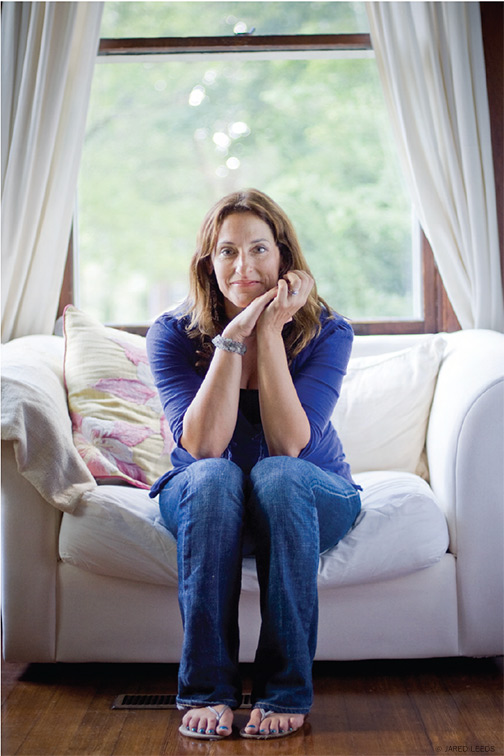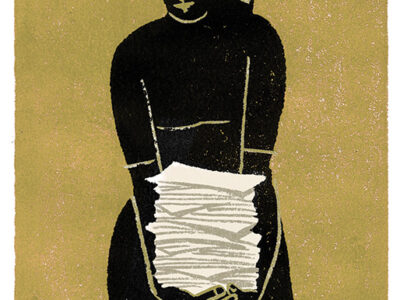
In her new book, writer-mom and autism activist Susan Senator C’84 G’85 shows how to make the most of the unexpected life.
By Susan Frith
Photography by Jared Leeds
Plus: An excerpt from The Autism Mom’s Survival Guide

Park
It’s another day at the neighborhood park. Quinn, the hypercharged kid whose mom you met in childbirth class, is running in 10 different directions at once. And then there’s your own two-year-old, sucking his thumb and refusing to climb out of the stroller. When you coax, he cries.
You know Russian history, enough to fill an unpublished novel and a thesis on Tolstoy from your grad-student days at Penn. But your firstborn is a mystery. It’s not just the fact that he startled so easily as a baby, but how he lines up his toys only to stare at them. “A little genius” the pediatrician calls your son, because he can recite long passages from The Velveteen Rabbit. But ask a simple question like, “Want juice?” and he just parrots the words back to you.
Finally, you are given a name for his quirks: autism. You think of children spinning on the floor and banging their heads. You think of Rain Man. You think of countless doors closing.
“There was this horror based on ignorance and fear, but also a validation,” recalls Susan Senator C’84 G’85, a mother of three and the author of two books on parenting a child with autism. After her oldest son Nat’s diagnosis at age three, she explains, “This was what I thought: that for the first time as a new mother, I was right about something. What I had been seeing wasn’t about me. It was something about Nat and his development. This kind of release and horror came together at the same time, followed by Now what?”
If Senator could have written to her younger self, she would have counseled that the world was not ending for her son or her family. “I would want to give myself a pat on the back and say, ‘It’s going to be OK. It’s just going to be different than how you first imagined it.’”
Though she can’t go back in time, Senator has been passing along her encouragement, wisdom, and stumbling to other parents through her blog (susansenator.com), articles and essays, and books. Her latest one, The Autism Mom’s Survival Guide: Creating a Balanced and Happy Life while Raising a Child with Autism, explores topics like self-care, connecting with one’s partner, and letting go—concerns that could apply to any parent but which have a special resonance for autism moms and dads.
Senator got the inspiration for her survival guide while on tour for her first book, Making Peace with Autism: One Family’s Story of Struggle, Discovery, and Unexpected Gifts [“All Things Ornamental,” Jan|Feb 2006]. People would come up and ask her questions like, “How do you even have a life? You’ve showered and you’ve put on makeup, and yet you have this situation in your family.” As a result, she began thinking about how many “autism moms” (and dads) “seem to have put their lives on hold” as they struggle to make sense of the condition, pursue new therapies, and find support for their children in the school system. She talked with parents to see how they had found balance in their lives and come to a point of acceptance. All of this, Senator makes clear, is a work in progress.
Boy
It was not your typical pick-up line. Senator was a sophomore communication student walking through the lobby of Van Pelt College House when she ran into fellow resident Ned Batchelder EAS’84. The bearded, pony-tailed engineering major was on the way to the Wawa convenience store to buy some milk. Did she want to come along? Senator turned him down, thinking Cute guy, but weird. When she bumped into him the next day, he flashed a devilish grin and said, “You missed a really good time.”
“I realized he was funny, in addition to being cute, and not a typical guy at all,” Senator says. “That was the moment I fell for him.” (Batchelder, now a software engineer for Hewlett Packard, recalls chatting with Senator at a house party earlier that year and noticing “four or five other guys” vying for her attention. “I thought this was going to be a stiff competition,” he says. The milk run was not intended to be a date, he claims, but “she thought I was nuts.”) They married right after graduation, staying in Philadelphia while Senator earned her master’s degree in Russian intellectual history (“a fantasy lifestyle”) and Ned worked in an engineering lab. Then the couple moved to Boston, where Nat was born three years later.
Senator couldn’t wait for motherhood. “It was all I could think about,” she says. “Even when I was playing video games, my user name would be babynow.” After she arrived home with her beautiful blond baby, however, that eagerness was replaced by postpartum depression and self-doubt. Shouldn’t her son act more, well, adoring of her? The pediatrician didn’t seem concerned. What sent Senator back to the doctor was Nat’s emotional meltdown two years later at the Passover seder hosted by her aunt. During the entire feast he refused to leave the front door.
Even after Nat’s diagnosis, Senator and Batchelder realized they didn’t have a clear guide to follow for their son. Two decades ago there were no Internet discussion boards, no doctor’s handouts on autism, and few books on the subject. “Nobody knows” what to do, the pediatrician told them. “You have to determine what is the best approach for him by observing.” As a result, they tried or at least researched many therapies, from gluten-free diets and neurofeedback to music therapy and medications. “We started to feel there were going to be a lot of trends,” Senator says, “and we started to be suspicious of most things that were new.”
Over time they found that what was most effective for Nat—though far from miraculous—was guiding his behavior through positive-reinforcement techniques that were used in his school (one of many programs they tried enrolling him in) and breaking new tasks into smaller steps.
Senator, meanwhile, turned to therapy and support networks of like-minded people to cope. As she explains in Survival Guide, much of her stress stemmed from her own perceptions of autism, how she blamed herself, and how she felt others viewed Nat because of his disability. When Senator blurted out the news of Nat’s diagnosis to her son’s playgroup, for instance, she was met with uncomfortable silence from the other moms. It was hard not to see everything he did through the lens of disability. She cringed at the dirty looks when Nat tossed sand in kids’ faces at the park. What might be seen as an episode of over-exuberance in the average child convinced her how different he was.
Gradually, though, Senator began to connect with others through an autism support group. “I had a friend, Sheila, who had a kid like Nat and we would get together at the playground and really joke about our lives and how different we felt from the other mothers around us and all their perfect children.” She started to feel less like a victim.
Even though she may not have realized it at the time, Senator had already begun taking concrete steps to help her son before his diagnosis. As Thanksgiving at her aunt’s house approached around the time of Nat’s third birthday, Senator knew she didn’t want a repeat performance of his previous meltdown. New experiences seemed to upset him though. If only there was a book that could show him everything to expect about the holiday, she told Batchelder.
“Why don’t you make the book yourself?” he asked.
Senator took up the challenge. She created a “crisis storybook” detailing everything that might happen at Thanksgiving, using basic sentences and photos of family members. Nat wanted to hear the story read over and over; when Thanksgiving came, he was ready to participate. Following that success, Senator made stories to prepare Nat for other occasions, including a Christmas visit with Ned’s family, a house move, and a trip to Cape Cod.
Senator loved the Cape, where she had vacationed as a girl. The first trip there with Nat had been a disaster, however. He cried constantly, as if he couldn’t understand why anyone would want to spend time on a beach, and they had ended their vacation early, driving home in the rain. Determined to make this next trip work, Senator explained every beach-related activity in pictures and simple language.
“Everything that could potentially be a tantrum I’d cover, like outdoor showers and going to a restaurant,” she says. Though it was hardly a stress-free time, vacationing together made Senator feel they were a “real family,” she says. “It started feeling like it was going to be all right just as it was.”
Though Nat had his crisis storybooks, Senator didn’t have such a resource to help her navigate the unexpected. When Nat was seven, he went through a six-month phase of not sleeping every other night. Senator found herself stationed outside her son’s bedroom door, awakened by his repetitive laughing. “It was hellish,” she recalls. “We were miserable. I don’t know how my husband Ned went to work every day.”
One afternoon Senator packed a bag and announced to her family that she was leaving. “I need sleep,” she told them. “It was kind of a crazy moment.”
She got as far as a neighbor’s house across the street. The neighbor, who was about her mother’s age, told Senator about problems she’d faced with her own daughter years ago. An hour later Senator returned home, buoyed by this new connection she’d made. “Until then we hadn’t really talked to anyone around us about what was going on.” Once they understood, Senator’s neighbors were supportive, even when Nat would ride his bike through someone’s garden. “People on the street started to say, ‘Oh, that’s Nat. That’s OK.’” Medication brought more relief as Nat started to sleep well again, and Senator gathered her strength for his next phase.

Laugh
Your son, now 12, has been going through an annoying stage of fake laughter. He gets right in your face, making you angry and tense. One afternoon you are ready to give up. Almost instinctively, you sit next to him and start to match his obnoxious giggles with your own, tickling him and demanding, “What’s so funny?”
Soon you are both laughing together for real and then the laughter stops. Your son looks at you—really looks in your eyes—and you see he is not a monster or a set of problems to manage. He is just a boy trying to connect.
You will remember this next year at his bar mitzvah, because you are determined that he will not miss out on this rite of passage. He will start to giggle during the ceremony and you will summon all your will to smile calmly at him while dozens of guests watch and wait in the ballroom you’ve rented. He’ll finish reciting the prayers he has spent weeks memorizing, and the rabbi will read from the Torah. Of course you will cry.
Book
The crisis storybooks that Senator made for Nat did more than guide him through new experiences. They also helped launch a writing career. Impressed with her ideas, Senator’s mother-in-law suggested she write about them to help others in her situation.
When her first article came out in Exceptional Parent magazine, “It blew my mind,” Senator says. “It was very validating because all of my writings had been so private until then, and had been unsuccessful except for my master’s thesis. (By now Senator had two novels languishing in her attic.) This [publication] told me that I was not only a decent writer, but I had something of value here and that maybe I also was doing a good job as a mother.” That first short article led to more pieces for TheNew York Times, TheWashington Post, TheBoston Globe, and Education Week.
Senator began compiling journal entries about her ups and downs with Nat, which she referred to as “Extreme Parenting.” She shared one such experience in an essay for the Gazette [“Alumni Voices,” July|August 2002]. Unsure what to put in her biographical note, she wrote that she was working on a book about autism. “After the essay came out, I got a few emails and letters from alumni saying, ‘I want to hear about your book.’” Senator laughs. “So I thought I’d better [actually] write it.”
Making Peace with Autism won the Exceptional Parent Award of Excellence, and its publication eventually led to Senator’s blog and second book. “What [readers] tell me is that they feel they’re not alone and they feel like I’ve expressed some of their thoughts and worst fears, and we’re all still standing,” she says.
“Oh how this speaks to me today!” wrote a mother in response to one of Senator’s blog posts about feeling guilty when she didn’t feel like taking a walk with Nat to Starbucks one day. (She knew she would get sweaty from trying to keep up with her son’s fast gait and be embarrassed by his exuberant hand flapping, but she talked herself into the outing.)
Senator’s writings don’t just open a window on her relationship with Nat. They also reflect on the ups and downs of her marriage and the ways that Nat’s whole family has responded to his autism at different points. “It can be a little uncomfortable,” Batchelder admits. “I’ve been at a book reading when she’s read sections of the book that don’t always cast me in a flattering light. But I think her hallmark as a writer has been how honest she is. She gives a whole picture of what it’s like to have a real family dealing with real situations. It isn’t always like a Hallmark card.”
Life may not have been perfect, but “getting validated through the work I was doing definitely made me feel healthier and stronger,” Senator adds. In her second book she underscores how important it is for parents to make time for themselves. “It’s not shameful to do things for yourself, and to want to be the star sometimes,” she writes in Survival Guide. “What’s more, it’s absolutely imperative, not just because we’ll be better mothers after we’ve been good to ourselves, but because we need to do this to be full human beings.”
One mom in Senator’s book turned to motorcycling, another got into scrapbooking. Senator “escaped” by writing about her experiences and becoming politically active. She ran for the local school board and spent five years advocating for special-education spending in her district. A couple of years ago she began to teach writing at Suffolk University.
As her writing evolved from a pastime to a job, Senator discovered another creative outlet in the world of hip scarves and harem pants. “I saw a video of [pop star] Shakira [bellydancing] and I thought … ‘Why can’t I do that?’
“I suddenly had this incredible need to learn this dance that younger women were doing, but I also found that older women were doing, too,” she recalls. “There was a whole supportive community that was interested in sparkles and taking classes and nobody was talking about autism.” She tries to be sensitive to any embarrassment that her adolescent sons might feel by picking times when they’re not home to practice her belly rolls. “But the message is I’m not some sort of background figure that’s just there to serve them.”
Just as she makes time for herself, Senator has struggled to nurture her marriage and other family relationships, giving her two youngest sons, Max and Ben (who don’t have autism), the same amount of attention she gives Nat. “My husband and I would really try to do things like we’d split up so each of us could be with Max and Ben without Nat sometimes. Or we’d get a sitter for Nat.”
Senator’s book also gingerly steps through the ever shifting (and often heated) debates about autism’s causes and treatments. Although she empathizes with parents who seek a biomedical cure through dietary changes or vitamin supplements for their children, she tends to finds her peace in the neurodiversity, or autism-acceptance, movement. “I do feel like acceptance of the unusual and atypical is a good thing for people,” she says. Not only does it help build a relationship with the person who has autism, but it also encourages society to be more tolerant. “Maybe this odd guy who flaps his hands and talks to himself is going to be the most dedicated worker on your team, because he doesn’t care about gossiping and doesn’t take a day off. He just wants to work.”
Man
A change in routine, a different kind of breakfast, an unzipped purse: the smallest thing could set Nat off. When he turned 17, he entered an aggressive phase of screaming and biting his arm when things didn’t go according to plan.
“The back of my hands are bloody and my spirits are low,” Senator wrote in her blog on December 13, 2007. “Big struggle this morning with Nat, especially between him and Ned. Nat would not sit down in time-out this time. That’s a first. His arm is a mess from his biting. He let me clean and bandage it. I was struck by the odd juxtaposition of little blue ice bunny sitting atop Nat’s muscular bruised forearm.”
“I can’t get the image out of my head of Ben racing upstairs to escape as Nat came close to him,” Senator went on. “I tried to make myself calm—invisible, really—so that Nat would not detect my fear. It only worked up to a point. He eventually came up to me, clawing at me. I stood my ground and kept my voice soft, trying also to rescue my hands, but he is very quick and strong.”
While Nat’s behavior upset his parents, it was traumatizing their youngest son, Ben. “I didn’t always feel that I could completely protect him,” Senator recalls. They began thinking that the next year would be a good time for Nat to work on independent living at his school.
Both Nat and his family needed time to prepare, however. He went to sleep-away camp for the first time and got the experience of depending on others for his needs. Senator would tell him, “Pretty soon, at the end of the summer, you’re going to be sleeping in a different house with teachers. It will be just like camp, but you’re going to be at school.”
Nat also went for visits to the house where he would be living. His parents even threw a farewell party in their backyard, inviting extended family and all of the residents. “That’s my solution to everything—a cake and a moon bounce,” Senator laughs. “We turned it into a celebration.”
In spite of all their preparations, Senator was devastated when Nat finally moved out. “I think it took me almost a year to feel good about taking him back [to his school] on Sundays,” she says. “So much of my relationship with him is about being next to him in the same space because we don’t talk a lot, so having him not there made me feel like ‘What’s our relationship now?’”
With time, she has adjusted. It helps to see Nat come home for weekend visits with a smile on his face as he paces through his favorite rooms. (Senator calls his movements the “Joyful House Stompies.”) Wearing one of his signature yellow or orange T-shirts, “He’s just like sunshine in the house.”
During his time at school, Nat seems to have evolved into a calm and happy young man, no longer plagued by the same anxieties, Senator observes. “He likes new people. He just doesn’t want to talk to them. He loves routines, but he doesn’t have to adhere to them. Most of the time he just is who he is and we love having him around.”
On one recent visit Nat helped to bake the cake for his Dad’s birthday. He can follow two- or three-part directions and answer basic questions about a task like baking, even if he is unable at this point to offer his own explanations for things, Senator says. Nat now also works for a pizza restaurant, where he makes 120 boxes an hour. “He loves it and everybody talks about how he’s the most productive person there.”
For her part, Senator is no longer trying to “fix” Nat. She focuses her energy on helping to plan for his next probable move, at 22, into a group home. She’s not sure how much he thinks about the future, if at all. “I think he probably expects and hopes that things will continue the way they are,” she says. Based on the success of his first move, Senator hopes he will adapt well to the change.
Beach
You are on the beach at Cape Cod, where you’ve been coming for years now with your family. Your 20-year-old son is flapping his arms, getting a little too close to other people’s blankets.
Expecting this, you have sat close to the ocean, keeping your back to the strangers who might judge you. Though you still care too much about what other people think, your perspective about what is important has changed since the first time you brought Nat to the beach. You’ve gotten to know other autism parents. You’ve become an activist and an author. (You’ve even got a new novel with your agent. It’s better than your earlier forays into fiction, you hope, telling the story of a gardener with three sons and a messy marriage). But you’ve also learned from your son, who is simply himself, everywhere he goes.
Nat is hard to miss, a smiling young man with a thick mop of blond hair. Now he is talking to himself, and you know that people are staring. Then you think: How could anyone mind? The water is warm for Massachusetts, and you’ve got all this sunshine around you.
Susan Frith is a former associate editor and frequent contributor to the Gazette.
EXCERPT
The Prince and the Prom
At the end of May, when Nat was 19, I learned that his school would be having a prom, for the first time in its history.Terese, Nat’s teacher, told me with breathless excitement another wonderful thing: the boys would be getting tuxes! Ever the romantic, I immediately conjured up images of debonair Nat, dressed in crisp black and white. And I wondered: how would he feel, dressed up like that? Would he understand how special it was? I really hoped so.
Terese assured me that as a class they would go over what a prom was and what to expect, so they would be able to fully appreciate it. The kids would be encouraged to dance together; the school is all-autistic, so the kind of gregarious behavior associated with proms was not something that would come naturally to any of the students. No problem to Terese, however; she would teach them with social stories, which would outline behavior, step-by-step, such as how to ask someone to dance.
The anticipation of the prom made me starry-eyed for a few weeks, and I bragged to everyone that Nat was going to the prom. I wanted the whole world to celebrate the dream with me, the fact that this very disabled boy had come so far. I was also so impressed that his school had evolved to such a capable and humane level that they could offer such a wonderful experience to the kids. Every now and then I checked in with Terese, and then the residence staff to see how it was going with the prom planning. All was well. The boys would be visited by a tuxedo store at the nearby mall, and they would be fitted. They would also pick out their own colors.
A week before the prom I started to ask Nat all about it, to gauge whether he knew about this upcoming event. “Are you going to wear special clothes for the prom, Nat?”
“Yes,” he answered.
“What colors are you wearing, Nat?”
“Yelloworange,” he said, as if it were one word.
At the time I thought this answer meant he had chosen a yellow or orange cummerbund and tie. Now, however, I realize that he was telling me what he was wearing at the moment (a yellow T-shirt). Because of his language comprehension difficulties, Nat tends to think completely in the present. Sometimes, with his lack of conversational references to the past or future, he seems almost Buddhist in his immersion in the moment.
The morning of the prom I was so excited. I couldn’t wait to take pictures of Nat in his tux. I called the residence to ask what color boutonniere I should get him. But the house manager told me there were no tuxes. “It didn’t work out,” she said sorrowfully.
What?! Disappointment shot through my veins like poison. I tried to restrain my emotions, and quickly got off the phone. No tux. Yellow and orange tie? Not going to happen. After all that anticipation, it would be just a regular party. And Nat would be denied one more rite of passage that every teenager gets.
I was furious. If I had known this would happen, I would have taken him myself to a tuxedo store weeks ago! Just like when Nat was younger, I retreated to my “No one can really take proper care of Nat but me” stance. My dull, heavy anger traveled slowly up to my brain, but all of a sudden it sharpened into an idea. I had about four hours before I had to get Nat to the prom. I was damned if he was going there in a tweed jacket and jeans. I was going to get him a tux—now.
I started calling every tux place in the Yellow Pages. But it was too early and on a Saturday. I left frantic messages, “Please call me back if you can help!” I tried every chain that promised any kind of tux on the market. Nothing was open. No one called back.
Finally, I got through to someone. A soft-spoken man answered the store phone, and I described Nat’s size. He reassured me right away that they had what we needed. My husband Ned and I wasted no time and we whisked Nat off in the car.
The store was crammed with black suits, smooth and elegant, on white mannequins. I saw row after row of glossy silk vests with bow ties—even a yellow one, which I hoped Nat wouldn’t want, because there was a baby blue one that would be perfect with his eyes.
The man took in all that was Nat without raising an eyebrow. Good; I could not deal with explaining why my son was tromping through his store, waving his arms and shaking his fist, talking to himself in his own language. But I knew what Nat was feeling, because he was walking and talking so fast, wearing a wide grin and bursting into occasional giggles. Nat was clearly happy about the tux store, and perhaps about the entire prom.
Soon Nat emerged from the dressing room in black jacket, pants, and crisp pleated white shirt. I drew in my breath. He looked utterly beautiful, perfect. This was my son, my boy—but he was such a man! I fell in love with him all over again. How blessed we were!
“Oh,” I said, tears in my voice, “you look like a prince.” Ned laughed at me because he loves how overly sentimental I get. I blushed and drew out the baby-blue vest, and as I helped Nat button the stiff buttons, I suddenly heard in my head the words from Sleeping Beauty, one of Nat’s all-time favorite Disney movies. “Why, it’s my dream prince,” I said, imitating Princess Aurora.
I was trying to be light, but I was too overcome with the moment. All the different realizations were bursting like fireworks, one after another: Nat looking so handsome, and princely; the kind, helpful stranger materializing like a Fairy Godfather, with just the right tuxedo at just the right time; Ned and me, old enough to have a son going to the prom. And also, of course, there was autism, right here, all around us—and yet it made no difference.
Nat went off to his prom, and as soon as he saw his housemates and teachers, I think he forgot all about us. They applauded his tux, and he rewarded them with his wide, glorious smile. Most of the other boys had managed to get tuxes, too. One of his best friends had been named Prom King, and was bouncing around with a red velvet crown on his head. I actually felt a moment’s jealousy that it wasn’t Nat, but then I thought, “Well, Nat can’t have everything!” and laughed at myself. But he did have so much, I realized: he now had two homes and he loved them both.
Reprinted with permission from The Autism Mom’s Survival Guide: Creating a Balanced and Happy Life while Raising a Child with Autism by Susan Senator, copyright © 2010 by Susan Senator, published by Trumpeter Books, an imprint of Shambhala Publications, Boston (www.shambhala.com).




